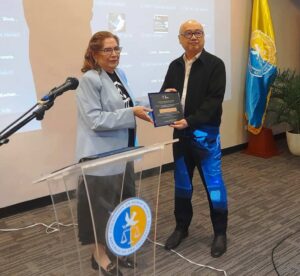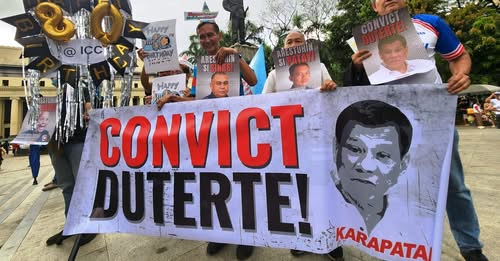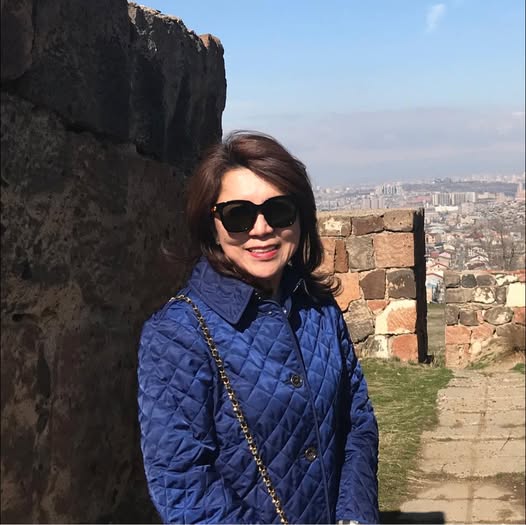DILG undersecretary Serafin Barreto Jr. and human rights commissioner Maria Amiefaith Fider-Reyes at today’s Bantay Bilangguan launch. (R. Villanueva/Kodao)
Persons deprived of liberty (PDLs) in the Philippines are victims of various forms of torture, a government official admitted, who urged major reforms in the country’s prison system.
Department of the Interior and Local Government (DILG) undersecretary for public safety Serafin Barreto Jr. said overcrowding in jails is a form of torture to PDLs that leads to other violations of their rights under various local and international standards.
“Unlike prisons in some other countries, food is delivered to our PDLs inside their crowded cells, forcing them to eat on their beds and making their surroundings stink. Our jails smell really bad, itself a form of torture,” Barreto said.
Such a situation leads to other problems, such as prisoners being susceptible to many forms of ailments, Barreto narrated at the Commission on Human Rights (CHR)’s launch of its national preventive mechanism (NPM) campaign against torture and other indignities in jail.
“No person deprived of liberty should be deprived of dignity,” Barreto said, expressing support to the CHR’s Bantay Bilangguan advocacy campaign to ensure detention facilities are “safe, humane and consistent with the highest standards of human rights.”
The Philippines has a total prison population, including pre-trial detainees, of 171,247 as of June 1, 2024.
This includes 53,397 inmates in Bureau of Corrections (BuCor) prisons and 117,850 in Bureau of Jail Management and Penology (BJMP) jails.
The Philippines has one of the most congested prison systems in the world with an overall occupation rate for pre-trail jails at about 322%.
The DILG oversees the BJMP which operates district, city, and municipal jails in the country. The Department of Justice (DOJ), on the other hand, oversees the BuCor.
DOJ Secretary Jesus Crispin Remulla admitted as early as 2022 to the congestion of jails, announcing plans to build more and bigger jail facilities to decongest prisons for convicted PDLs.
“Decongestion of our prison facilities is a humanitarian moral obligation and the first step in providing PDLs a more decent and conducive environment most suited for their reformation,” Remulla said.
The Supreme Court organized a national decongestion summit in December 2023, urging the government’s three branches to unite in finding solutions to jail and prison overcrowding in the Philippines.
CHR launches ‘Bantay Bilangguan’
In a formal launch in Quezon City on Friday, CHR said its newest advocacy initiative focuses on upholding the dignity and rights of all PDLs through the passage of the NPM Bill in Congress.
The national human rights institution said such a law is in line with the Philippines’ obligations under the Optional Protocol to the Convention Against Torture (OPCAT).
“It also aims to strengthen the CHR’s role in preventing torture and protecting human rights in places of deprivation of liberty, while contributing to the national aspiration of a torture-free and rights-respecting Philippines,” it said.
“CHR reaffirms that torture, cruel, inhuman, or degrading treatment or punishment is a grave abuse of power that can never be justified. While the Philippines ratified OPCAT on 17 April 2012, it has yet to establish its NPM, unlike the 94 other state parties,” CHR said.
This 13-year delay emphasizes the urgency of upholding the rights of PDLs and promoting accountability within detention systems,” it added.
The launch was timed on Nelson Mandela’s 107th birth anniversary today, after whom the United Nations Standard Minimum Rules for the Treatment of Prisoners (Mandela Rules) are named.
History’s most popular political prisoner, Mandela spent 27 years in prison during his fight against apartheid in South Africa. He was incarcerated from 1964 to 1990.
‘PH jail system ignores Mandela Rules’
Meanwhile, political detainee support group Kapatid again accused the Bureau of Corrections (BuCor) of ignoring the Mandela rules in violating PDLs’ rights.
Kapatid spokesperson Fides Lim said the BuCor violates the seven-stage procedure on prisoners involving intake, classification, housing, programming, release preparation, and monitoring.
The procedure is a framework for ensuring prisoner safety, security, and rehabilitation while upholding human rights, which the bureau violates, she explained.
Lim had recently been “permanently banned” from visiting BuCor-managed jails, such as the National Bilibid Prison and the Correctional Institution for Women, for alleged “unruly behavior.”
Lim however, contests the ban, saying her punishment is a politically motivated move to silence those who dare to speak up against arbitrary, excessive, and abusive policies in jails.
“The real issue here isn’t behavior, it’s opposition to a seven-stage procedure—and as many rules as there are guards—that prolongs the suffering of families and political prisoners alike as well as PDLs,” Lim said.
“At the end of that process? Reduced food, increased hardship, and hunger. So, while some want to label complaining as misbehavior, isn’t it exactly the kind of action needed to challenge the real injustice at play?” she asked.
“Today, on Mandela’s birthday, may we remind the BuCor in particular that he (Mandela) was a political prisoner—someone who fought for justice and wasn’t silenced, even when faced with an oppressive system behind bars and outside,” Lim said.
CHR commissioner Beda Epres told Kodao that they are aware of the BuCor’s ban of Lim and urged the PDL rights advocate to formally submit a complaint for the commission to start its investigation on the matter.
Epres also promised to investigate complaints of maltreatment by the Tacloban City Jail Female Dormitory warden on jailed journalist Frenchie Mae Cumpio and church lay worker Marielle Domequil. | via KODAO PRODUCTIONS




